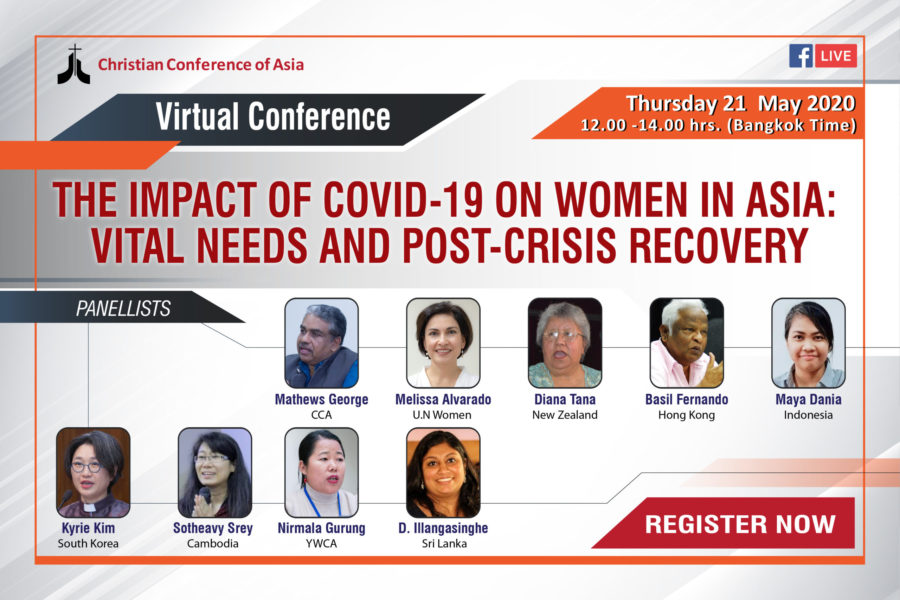‘The impact of COVID-19 Crisis on Women in Asia and Post-crisis Recovery’ will be the focus of CCA’s fifth virtual conference

The fifth in a series of virtual conferences (webinars) hosted by Christian Conference of Asia (CCA) in the context of the global COVID-19 pandemic will be focused on the theme, ‘The Impact of COVID-19 on Women in Asia: Vital Needs and Post-Crisis Recovery’.
Scheduled for 21 May 2020 (Thursday) from 12:00 to 14:00 (12 PM to 2 PM) Bangkok (Thailand) time, the webinar will discuss the magnitude, impact, and challenges faced by Asian women in the context of the COVID-19 crisis.
The discussions will examine the way in which people and communities in different countries and regions in Asia are responding to the vulnerable situation of women amidst the pandemic. The panellists will also analyse the possibilities of addressing this context of distress and deprivation, and explore viable ways of ensuring that the vital needs of women are met in the midst of the pandemic. They will also be envisioning the design of post-crisis recovery in Asia.
The discussions of the webinar will be led by an expert group of panellists comprising representatives of the United Nations’ Women’s division, human rights and civil society organisations, as well as church and ecumenical women’s organisations in Asia. Melissa Alvarado (UN Women Asian Pacific); Maya Dania (Mae Fah Luang University, Thailand/Indonesia); Basil Fernando (Asian Human Rights Commission-AHRC/Hong Kong); Rev. Diana Tana (Vice Moderator, CCA/New Zealand); Sotheavy Srey (Alliance for Conflict Transformation-ACT, Cambodia); Rev. Kyrie Kim (Chairperson of CCA Programme Committee/South Korea); Nirmala Gurung (YWCA Asia/Nepal); and Deekshya Illangasinghe (South Asians for Human Rights-SAHR/ Sri Lanka) will lead the webinar.
Dr Mathews George Chunakara, the General Secretary of the CCA, will initiate and facilitate the discussions.
Those who are interested in participating in the webinar may register by clicking on this link – https://forms.gle/5pvSsdAYQXfkc1Zo8
For additional details, please go through the concept note below –
The Impact of COVID-19 crisis on Women in Asia Concept Note
Since the webinar can accommodate only 90 participants, registration will be accepted on a first-come, first-served basis.
The Reports of CCA’s previous webinars:
- The Plight of Migrant Workers amidst the COVID-19 Crisis (30 April 2020)
Report | Highlights Video
- Churches in Asia Responding to the COVID-19 Crisis (7 May 2020)
Report | Highlights Video
- Right to Health amidst the COVID-19 Crisis (14 May 2020)
Report | Highlights Video










